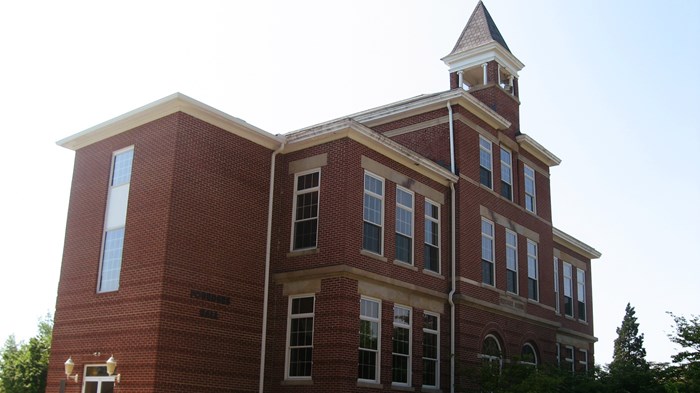
This spring, Cedarville University enacted new curriculum guidelines inspired by Philippians 4:8 and aimed at purifying coursework of erotic and graphic content.
Cedarville, a buttoned-up Baptist school with a 130-year Christian history, is not the kind of place where professors assign Fifty Shades of Grey or anything close. But administrators want to err on the side of caution. This means, for example, that now an R-rated movie like Schindler’s List cannot be shown in its entirety, nor can students put on plays that include swear words.
In its Biblically Consistent Curriculum policy, nicknamed for the Apostle Paul’s admonishment to Christians in Philippi, Cedarville has spelled out new guidelines officially barring any materials that “may be considered ‘adult’ in nature, that represent immorality, or that may be a stumbling block to students.”
The move comes as the Ohio school, located between Columbus and Dayton, unfolds a broader, campus-wide campaign to double-down on its biblical identity. At a time when fellow Christian colleges are looking to defy narrow evangelical stereotypes and compete with secular schools, Cedarville is instead deepening its conservative Christian distinctions.
When they heard about the Philippians 4:8 policy through department chairs and town hall meetings last month, faculty in the disciplines most impacted by the restrictions—which cover movies, plays, art, and texts—were frustrated. So were the small group of students who got their hands on a copy of the 1,500-word policy. They wondered: Why were these new rules necessary? How would they be applied?
Christianity Today heard from four current and former Cedarville faculty in the humanities who spoke on the condition of anonymity, citing fear of retaliation toward them or their colleagues for publicly criticizing the administration.
“Faculty in various department meetings were absolutely furious—even faculty who tend to be in favor of the administration’s policies,” said one of the dozens of concerned professors who showed up at the town hall meetings held by administrators in March. “It seems to me the goal is to have a squeaky clean, shiny place—scrubbed clean like a Christian bookstore.”
‘Whatever Is Pure’ vs. ‘True’
Drafted by Cedarville’s vice president of academics Loren Reno and assistant vice president of academics Thomas Mach, the policy focuses on applying the “whatever is pure” line from Philippians 4:8 (as well as several other passages directing Christian living) to materials assigned in departments like English, art, and communications. The biggest targets: swear words, graphic violence, sexual nudity, and other erotic content.
When introducing the new standards, administrators mostly stuck to guiding principles rather than making hypothetical decisions on specific works. Without more clarity, some Cedarville constituents worried that the guidelines could go too far and restrict materials central to their curricula.
The policy was instituted immediately, and administrators have already asked instructors to remove materials deemed to violate the new standards.
Despite an explicit push to rely on biblical backing, the Philippians 4:8 policy is less concerned with “whatever is true” or “whatever is lovely.” A copy obtained by CT makes clear that “students will often be exposed to assumptions, philosophies, and ideologies within various fields that run counter to the truth of God’s Word,” and that those challenges are a crucial part of the educational experience.
“We weren’t talking about science anatomy textbooks. We weren’t talking about determinism in the field of history,” said Mach, who is also a history professor at Cedarville. “That’s not at all what the policy was designed to address.”
In conversations with CT, students speculated which materials in their current coursework would no longer be acceptable under the Philippians 4:8 policy. One wondered if the vulgar Greek comedy Lysistrata would make the cut. The policy has not been publicly released, but still became the subject of campus chatter within the student body of 3,700.
“You don’t know how they are really going to enforce it,” said Naomi Harward, a senior at Cedarville. “We have to wait and see how it impacts classes.”
A Tipping Point
Faculty who oppose the new policy agree that classroom material should be subject to biblical critique; many already apply such standards to any work they assign. But they don’t like the idea of a top-down mandate, which concludes by telling faculty they are accountable for their coursework choices “before God and the administration.”
Some fear that the policy targets certain departments and the conservative shift on campus eventually won’t include them or their disciplines. “They tried to get rid of faculty before,” one professor said.
Over the past decade at Cedarville, the school has replaced its president and vice president, terminated faculty over theological positions (even when in agreement with its doctrinal statement), eliminated its philosophy major, and strengthened its complementarian stance. Two years ago, Cedarville left the Council for Christian Colleges and Universities.
Cedarville is not alone in the tumult. CT has reported on tensions over theology and identity at Christian schools including Bryan College, Baylor University, Northwestern College in St. Paul, Calvin College, and Patrick Henry College in recent years. (Even more: Shorter University lost nearly half of its 100 faculty members; Erskine College ended up taking its denomination to court, which cost it its president.)
One faculty member who spoke with CT said the Philippians 4:8 policy was the “tipping point” that prompted several professors in multiple departments to begin looking for jobs elsewhere. Some have started going to counseling to address anxiety over their future.
“The goal here is really not designed to create an environment of fear or mistrust,” said Mach. “It’s designed to create more conversations about these things to make sure we’re on the same page as an institution.”
According to Cedarville, no particular incident prompted the changes. Though the school now enrolls hundreds of high school students in the same classes as undergraduates, the new policy is not an attempt to make courses more age-appropriate for them. Instead, it is aimed at the student body as a whole—and those who pay for them to come.
“We hear from parents regularly,” said Mach, attributing the uptick to generational concerns of so-called helicopter parents. “Part of the thinking on this policy is to be able to say to a parent who disagrees with what’s being used in class, ‘This is our approach. This is what we expect from our faculty. They’re maintaining that.’”
It’s natural for Christian parents, especially those who homeschool, to make sure their kids’ classes match the biblical standards and setting the school claims.
“When parents have been making curriculum choices in 12th grade, they aren’t going to stop caring when they go off to college,” said Michael Farris, chancellor emeritus of Patrick Henry College.
Farris, now the president of the Alliance Defending Freedom and general counsel of the Home School Defense Association, led Patrick Henry through its own shakeup over theology and academic freedom about a decade ago.
At Cedarville, professors were frustrated that the university did not seek their approval before enacting the policy change. “The lack of insight and the message of distrust to the faculty is insulting and demoralizing,” one said.
Mach acknowledges that the approach to leadership and accountability at a Christian institution necessitates that faculty have less say than they would at a state school.
“Faculty have the sense that policies should be originated by them or driven by them. That’s very much a part of academia—no question about it,” he said. “But Christian schools are distinct. In our handbook, these sorts of policies are driven by the board of trustees.”
“The [Cedarville] administration is not serving the students as much as the parents who are sending the students and the trustees and donors,” another student said.
Balancing the Bubble
Cedarville president Thomas White launched a campaign last year to bring greater “biblical wisdom and intentionality” to the roughly 1,000 days that undergrads spend at the university.
“God’s Word commands us to be in the world but not of the world,” he wrote, mentioning Philippians 4:8 as a guiding principle. “We must learn about sin, but we should not experience all forms of it. We must teach other worldviews, but in such a way to commend the truth and rightness of the biblical worldview.
“I suspect we are all in agreement on these things, but I commend them to you for your thinking as we move into more hostile waters culturally.”
The new policy’s instructions for faculty assigning reading material: “Passages that are clearly pornographic, erotic, obscene, or graphic must be avoided. While it may be important to expose students to various genres of writing, examples need to be selected to avoid inappropriate material.” For films: “As a general rule, ‘R’ rated movies will not be shown. PG-13, PG, and unrated movies should be evaluated based on language, sexual content, graphic violence, and nudity.” All scripts for plays put on by students cannot include swearing and must be approved by Reno.
Ultimately, the Philippians 4:8 policy represents the perennial “in the world, but not of it” debate, where Cedarville—like many similar schools—attempts to draw a line between meaningful, edifying cultural engagement and material that compromises the university’s Christian standards. Administrators purposefully want the school’s syllabi to look different from those at its secular counterparts.
“There are not as many faithful Christian colleges as people think,” said Farris, who admires Cedarville as one of only a few evangelical schools that he believes “still maintain their spiritual integrity.” He wants to see more institutions that “stand true to the Word and don’t give away their values to pressure from the academic Left.”
The push for distinction at Cedarville, by some measures, is working: The university ranked among the top five schools in the country for student engagement in a Wall Street Journal list.
As director of Cedarville’s new apologetics center, Dan DeWitt recognizes the benefits of exposing students to thinking beyond the “Cedarville bubble.”
One in six students at the university was homeschooled, and most come from solidly Christian backgrounds. Even without the objectionable content targeted in the new policy, they are bound to confront challenging ideas online, in most coursework, and in the community beyond the tiny Ohio town, he said.
“It’s helpful to have some broad principles, because you can justify everything as depicting fallenness,” said DeWitt, associate professor of applied theology. “There’s a difference between saying, ‘We’re going to read Jane Austen,’ and, ‘We’re going to watch Fifty Shades of Grey.’”
Within the theology department, he has not heard complaints about the Philippians 4:8 policy, though he couldn’t imagine any of his course content being impacted by the guidelines.
Know Your Audience
Many Christian universities require faculty to ascribe to a statement of faith and to meet other religious requirements. Some also have additional statements regarding objectionable content or R-rated movies, such as provisions that allow students to opt out according to their convictions.
However, it’s less common to see detailed guidelines specifically directed at classroom materials.
“It’s the responsibility of a Christian college board and administration to give broad, general standards and guidelines to ensure a Christian worldview,” said Farris. “It doesn’t meddle in particular choices of this book or that book.”
When CT shared portions of the Cedarville policy with professors at The King’s College and Liberty University, they said that neither conservative school had comparable rules.
Karen Swallow Prior, an English professor at Liberty and author of a memoir about the spiritual impact of secular literature, expressed concern about applying a policy that allowed students to engage with challenging ideas in the abstract, but not in specific works. “Literature is embodied. Art is embodied,” she said. “You can talk about adultery and suicide as ideas, or read Madame Bovary, which acts those out—albeit in fictional form.”
Prior recognizes that even with biblical critique, not all classic literature belongs in the Christian classroom. But she ultimately believes that English departments should equip students with a mature approach to challenging texts.
“It’s important when teaching in an evangelical Christian university to know your audience,” she said. “Contemporary evangelical Christian students do not have a robust theological understanding of art and literature. So I recognize that most students—and some administrators and parents—need to learn how the study of secular literature is not only compatible with a biblical worldview, but demonstrated by a biblical worldview.”
Alissa Wilkinson, associate professor of English and humanities at King’s, said it was “admirable and understandable” for Cedarville to put biblical backing to its classroom policies. But she also brought up potential concerns.
“I've also seen verses like this, [if] unevenly applied, have two results: keeping young people from being able to discern the difference between depicting and glorifying sin, and keeping young people from being able to discern between excellence and safety,” she said. “So I'd love to see Christian colleges not focus only on all of Philippians 4:8, but also other passages—such as Acts 17:16-32 [Paul at the Areopagus in Athens]—when they think about their standards.”
Wilkinson, who’s also a film critic, warned against establishing policies based on MPAA ratings, which are inconsistent measures of content. Liberty, founded by the late Jerry Falwell and now America’s largest Christian college, actually dropped penalties for watching R-rated movies a year and a half ago. The school instead asks students to “use caution when watching movie content rated R or PG-13 and video game content rated M.”
At Cedarville, Mach said the new policy offers guidance for professors, clarity for parents, and consistency for students, who are encouraged to be discerning in their personal entertainment choices. (This is much more leeway than when Mach was at Cedarville in the ’80s and students were not permitted to go to movie theaters).
What some of the most critical Cedarville faculty view as censorship, administrators see as a push for transparency about the priorities of the campus and its direction.
“We all recognize that there’s a line,” he said. “We just disagree over where that line is sometimes.”

Support Our Work
Subscribe to CT for less than $4.25/month


















